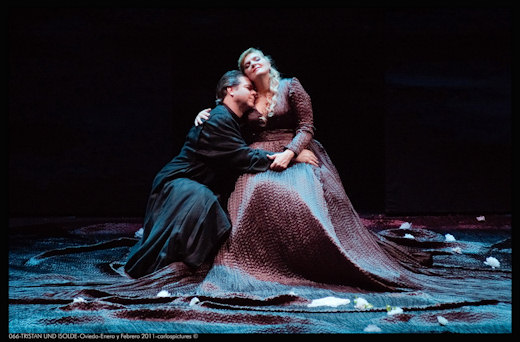Other Links
Editorial Board
- UK Editors
- Roger Jones and John Quinn
Editors for The Americas - Bruce Hodges and Jonathan Spencer Jones
European Editors - Bettina Mara and Jens F Laurson
Consulting Editor - Bill Kenny
Assistant Webmaster -Stan Metzger
Founder - Len Mullenger
Google Site Search
SEEN AND HEARD INTERNATIONAL OPERA REVIEW
Wagner, Tristan und Isolde: Soloists, Orquesta Sinfónica del Principado de Asturias, Coro de la Ópera de Oviedo. Conductor: Guillermo García Calvo. Teatro Campoamor de Oviedo. 27. 1.2011. (JMI)
Production: Ópera de Oviedo.
Direction: Alfred Kirchner.
Sets and Costumes: María Elena Amos.
Lighting: Eduardo Bravo.
Cast:
Tristan: Robert Dean Smith.
Isolde: Elisabete Matos.
Kurwenal: Gerd Grochowski.
Brangaene: Petra Lang.
King Marke: Felipe Bou.
Melot: Javier Galán.
Steersman/Shepherd: Juan Antonio Sanabria.
Pilot: Jorge Rodríguez-Norton.

Production Picture - Courtesy Teatro Campoamor
de Oviedo
Oviedo, like every other city in Spain, is suffering the consequences of the present financial crisis and the company has been forced to cancel a projected Lohengrin and come back to their Tristan production, which was premiered 3 years ago. Alfred Kirchner has conceived a production well suited to the Teatro Campoamor, offering an attractive and minimalist staging. Sets consist of mobile panels which are closes most of the time to facilitate vocal projection. Costumes are unproblematic and rather timeless, and are also well suited to the production. In this kind of of minimalist production the lighting acquires great importance and Eduardo Bravo’s work was a wholly excellent complement here. The stage direction by Alfred Kirchner is generally very static, with the lovers located at opposing sides of the stage in the first act and much of the second, while using a couple of mimes as doubles - not a very happy idea, since this time the new Tristan and Isolde were much better actors than at the premiere.
Initially the musical direction was entrusted to Friedrich Haider, but he cancelled a few months ago due to problems with one of his shoulders. The choice of his substitute was more than surprising, to say the least. Madrid born Guillermo García Calvo is a conductor with ever increasing activity in German speaking countries, but always in Italian repertoire, with occasional forays into Mozart. If I am not mistaken this was his actual debut at conducting a Wagner opera and Tristan is certainly not the easiest score for a debutant. I admit that given his background my expectations were not high but Mr. García Calvo’s reading had some very real strengths as well as weaknesses. Among its virtues, was his clear determination to control orchestral volume and his gestures were admirably clear so that there were no coordination problems between pit and stage. He was at his best at the opera’s most intimate moments, conducting with great care and sensitivity - truly excellently in fact. Things did not work as well in the dramatic moments, where the intensity and the orchestral sound left something to be desired. The orchestra was a reduced one however, since a full orchestra for this opera cannot accommodated in this pit and its sound was simply not big enough for this magnificent score. All in all, it seems to me a very promising debut from the part of García Calvo. Having said that, while Wagner wrote very little music for the chorus in this opera, most of what there is, was too much for the Coro de Opera de Oviedo.
American tenor Robert Dean Smith was Tristan and he offered his well known interpretation of this role. There’s a beautiful voice, great musicality, wonderful ‘dosing’ of his vocal resources, but too little vocal weight in the last act. He is still not exactly a heldentenor, but he is certainly a most musical performer in this score.
The Portuguese soprano Elisabete Matos has been an undervalued soprano for many years and it seems that at last the big opera houses have began to recognize her potential. (Suffice it to say that she has just had a big personal success at the Metropolitan in La Fanciulla del West.) Her Isolde was rather too uneven however. She was quite compelling in the first Act, singing with much power and conviction but in the second act things did not go as well and there were too many uncontrolled notes. Finally, her Liebestod had emotion, but not much vocal brilliance. She is not a great Isolde to my mind, but there really aren’t that many of course.
The presence of Petra Lang in the cast had to do with the initially planned Lohengrin I’d guess, since she is an excellent interpreter of Ortrud. Brangaene is not a character where a great singer like her can shine over much but naturally enough she gave a fine performance.
Gerd Grochowski was a good interpreter of the noble character of Kurwenal. The voice is good, although not too large, being weakest in the top notes, which could sound rather tight and whitish. Felipe Bou was better than I expected as King Marke. Obviously, he cannot be compared to the greatest interpreters of this role, but he was more than simply adequate and much better than Andrew Greenan three years ago. In the secondary characters Javier Galán sang a good Melot and Juan Antonio Sanabria left a favourable impression as the Steersman and Shepherd.
Teatro Campoamor was sold out, as is usual at all of its premieres, with numerous black tie outfits for gentlemen and long dresses for ladies. The audience gave a thoroughly warm reception to the artists at their final bows with some cheering for Robert Dean Smith, Elisabete Matos and Guillermo García Calvo.
José Mª Irurzun
